 No idea if we’re ever going to see it turning up in Blighty any time soon, but we love this crazy new Sony VN-CX1 USB optical mouse-phone.
No idea if we’re ever going to see it turning up in Blighty any time soon, but we love this crazy new Sony VN-CX1 USB optical mouse-phone.
The press release is only in Japanese, but we worked out that mouse-phone (‘phouse’?, moune?) is able to notify you of incoming calls via flashing LED and built-in speaker.
When closed, the mouse works like any other with the dial in the middle functioning as a scroll wheel.
 The clever stuff happens when a call comes in.
The clever stuff happens when a call comes in.
The user can then flip open the mouse to reveal a functional phone, with the mouse-wheel being used to adjust the volume. Pressing the scroll wheel mutes the call.
The built in echo cancellation feature should guarantee decent call sound quality, and finishing the call is as simple as flipping the mouse-phone shut.
 A potential problem might arise if you wanted to use the mouse when you’re on a call, but we think you can just switch to speakerphone mode. Or maybe not (the translated press announcement goes on about ‘knitting machines’ so it’s a bit vague).
A potential problem might arise if you wanted to use the mouse when you’re on a call, but we think you can just switch to speakerphone mode. Or maybe not (the translated press announcement goes on about ‘knitting machines’ so it’s a bit vague).
Being a Sony product, the Sony VN-CX1 looks to please groovy feckers, offering the mouse in 5 trendy colours to match their shade of laptop/shirt/nail varnish.
 Although the VN-CX1 doesn’t look like the most comfortable mouse we’ve ever seen, it’s small and light enough (45.5 × 23.9 × 89.2 mm, 67gms) and certainly looks a fun product.
Although the VN-CX1 doesn’t look like the most comfortable mouse we’ve ever seen, it’s small and light enough (45.5 × 23.9 × 89.2 mm, 67gms) and certainly looks a fun product.
Pricing and availability is to be announced.
 D-Link’s new Skype USB phone adapter (DPH-50U) is a neat widget that lets users make and receive Skype calls on their existing corded DECT or cordless phone, without the need to have a pesky ‘call centre’ headset stuck on their head.
D-Link’s new Skype USB phone adapter (DPH-50U) is a neat widget that lets users make and receive Skype calls on their existing corded DECT or cordless phone, without the need to have a pesky ‘call centre’ headset stuck on their head. The concept seems a winner to us – by using your existing telephone you should enjoy better sound quality than a cheapo headset, and D-Link claim that you’ll be able to use your phone’s built-in features such as speed dial, redial, mute and caller ID2 for both Skype and landline calls.
The concept seems a winner to us – by using your existing telephone you should enjoy better sound quality than a cheapo headset, and D-Link claim that you’ll be able to use your phone’s built-in features such as speed dial, redial, mute and caller ID2 for both Skype and landline calls. The DPH-50U comes with custom software, two RJ-11 ports and a USB port to connect up the regular phone line, telephone and computer, with the unit drawing power from the computer’s PC port.
The DPH-50U comes with custom software, two RJ-11 ports and a USB port to connect up the regular phone line, telephone and computer, with the unit drawing power from the computer’s PC port. Yahoo is launching a new service aimed at making it easier for users to connect to Yahoo Internet-based services through multiple Web-connected devices, including mobiles and TVs.
Yahoo is launching a new service aimed at making it easier for users to connect to Yahoo Internet-based services through multiple Web-connected devices, including mobiles and TVs.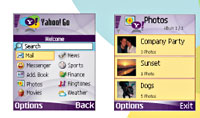 So long as the device is connected to the Internet, users will be able to access their personal Yahoo content such as photos, email and address books.
So long as the device is connected to the Internet, users will be able to access their personal Yahoo content such as photos, email and address books. Yahoo! will be rolling out their Go TV service in the next few months, with the service enabling users to access various other Web based services for TVs, including local movie listing search and personalised MyYahoo! functions.
Yahoo! will be rolling out their Go TV service in the next few months, with the service enabling users to access various other Web based services for TVs, including local movie listing search and personalised MyYahoo! functions. The BBC has decided to extend the trial for the iMP Player until 28th February 2006, telling trialists that the extra time will enable it to “understand what you want from the service and how you are using it”. A new upgrade of the software is due to be rolled out to the participating trialists in January.
The BBC has decided to extend the trial for the iMP Player until 28th February 2006, telling trialists that the extra time will enable it to “understand what you want from the service and how you are using it”. A new upgrade of the software is due to be rolled out to the participating trialists in January.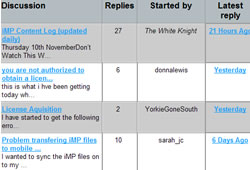 The BBC’s reaction to such sniping is consistent, if not a little bland
The BBC’s reaction to such sniping is consistent, if not a little bland The BBC is hoping to get Dr Who fans reaching for their red buttons en masse with a video-rich interactive TV application scheduled to run straight after the airing of the Christmas Day special (7:00PM GMT).
The BBC is hoping to get Dr Who fans reaching for their red buttons en masse with a video-rich interactive TV application scheduled to run straight after the airing of the Christmas Day special (7:00PM GMT). It looks that the BBC has invested muchos cash into the venture, employing live-action video and “state-of-the-art” special effects produced at the high end visual effects studio, The Mill.
It looks that the BBC has invested muchos cash into the venture, employing live-action video and “state-of-the-art” special effects produced at the high end visual effects studio, The Mill. Produced in Cardiff by BBC New Media and BBC Wales, producer Sophie Fante commented, “Attack of the Graske gives the viewer the unique opportunity to immerse themselves fully in the world of Doctor Who.”
Produced in Cardiff by BBC New Media and BBC Wales, producer Sophie Fante commented, “Attack of the Graske gives the viewer the unique opportunity to immerse themselves fully in the world of Doctor Who.” We can’t wait to watch this latest installment of the highly rated Dr Who series and are hoping to witness another kind of winter wonderland the day after when the mighty Cardiff City FC take on Plymouth.
We can’t wait to watch this latest installment of the highly rated Dr Who series and are hoping to witness another kind of winter wonderland the day after when the mighty Cardiff City FC take on Plymouth. With a fearful eye on Skype’s runaway success, Microsoft has joined the stampede to offer Internet-based telephony services by announcing a cut price, pre-paid PC-to-phone service, the result of a deal with the US telecommunications group, MCI.
With a fearful eye on Skype’s runaway success, Microsoft has joined the stampede to offer Internet-based telephony services by announcing a cut price, pre-paid PC-to-phone service, the result of a deal with the US telecommunications group, MCI. In recent months, Google, Yahoo! and eBay’s Skype unit have all chipped in with their own cheapo PC-to-phone VoIP (Voice over Internet Protocol) services.
In recent months, Google, Yahoo! and eBay’s Skype unit have all chipped in with their own cheapo PC-to-phone VoIP (Voice over Internet Protocol) services.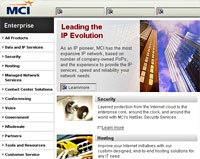 Similarly, Skype, the current big boys of the PC-to-PC VoIP market, are offering calls for about 2 cents a minute from a PC to a phone in the US other countries.
Similarly, Skype, the current big boys of the PC-to-PC VoIP market, are offering calls for about 2 cents a minute from a PC to a phone in the US other countries.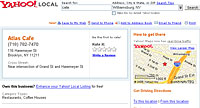 Using search engines has become the second most popular activity for Web users, according to new research from the Pew Internet & American Life Project.
Using search engines has become the second most popular activity for Web users, according to new research from the Pew Internet & American Life Project. ‘Gen X’ surfers (29-40 year olds, not the Billy Idol-fronted band) were online the most (51 per cent), followed by ‘Gen Y’ users (18-28 year olds), ‘Older Baby Boomers’ (51-59 yrs old), ‘Younger Baby Boomers’ (41-50), ‘Matures’ (60-69) and, finally ‘After work’ (70+). We wonder who makes up these daft categories?
‘Gen X’ surfers (29-40 year olds, not the Billy Idol-fronted band) were online the most (51 per cent), followed by ‘Gen Y’ users (18-28 year olds), ‘Older Baby Boomers’ (51-59 yrs old), ‘Younger Baby Boomers’ (41-50), ‘Matures’ (60-69) and, finally ‘After work’ (70+). We wonder who makes up these daft categories? It also provides practical guidance on how to use search effectively but safely, for example, by monitoring or filtering your search results.
It also provides practical guidance on how to use search effectively but safely, for example, by monitoring or filtering your search results.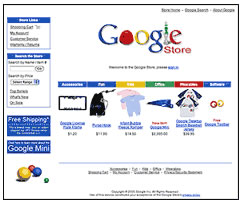 Always remember, Goggle may look like a search engine company, but it is, in fact, an advertising company.
Always remember, Goggle may look like a search engine company, but it is, in fact, an advertising company.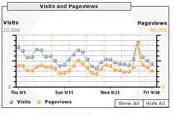 The history
The history Despite so much current talk from the UK Telco’s and Sky on the magic that will provide an on demand broadcast TV proposition in the UK, tangible evidence of a working model beyond KiT in Hull and Homechoice is pretty sparse.
Despite so much current talk from the UK Telco’s and Sky on the magic that will provide an on demand broadcast TV proposition in the UK, tangible evidence of a working model beyond KiT in Hull and Homechoice is pretty sparse. Despite the somewhat limited selection of programmes, which I’m told is largely down to copyright issues, it seems a positive move for a public sector broadcaster actually providing a service and solving the ‘problem’ of letting you see a programme you forgot to record or you later discover is worth viewing.
Despite the somewhat limited selection of programmes, which I’m told is largely down to copyright issues, it seems a positive move for a public sector broadcaster actually providing a service and solving the ‘problem’ of letting you see a programme you forgot to record or you later discover is worth viewing. The BBC is thinking beyond the present Windows-only solution. Speaking recently in London the BBC’s Project Director for iMP Ben Lavender reinforced the BBC philosophy of platform agnosticism and spoke of the desire to work on Apple and Linux solutions when DRM issues can be satisfactorily dealt with.
The BBC is thinking beyond the present Windows-only solution. Speaking recently in London the BBC’s Project Director for iMP Ben Lavender reinforced the BBC philosophy of platform agnosticism and spoke of the desire to work on Apple and Linux solutions when DRM issues can be satisfactorily dealt with.